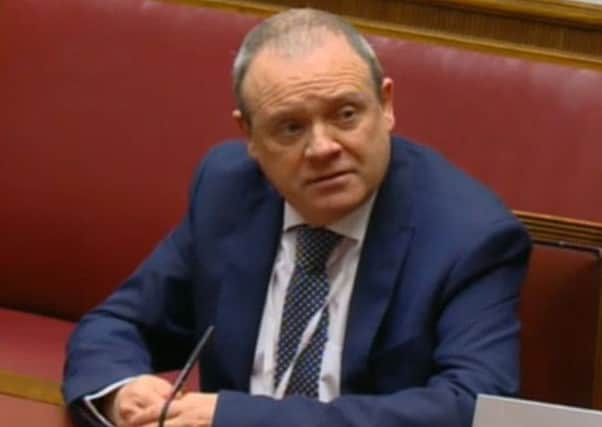RHI inquiry: official running scheme as it imploded had '˜close to zero' energy expertise


Seamus Hughes said that as applications poured in and it is now known that firms were openly marketing the scheme as ‘cash for ash’, he and his colleagues believed that the growing interest in RHI was positive and showed “this was starting to work the way it was meant to work”.
Mr Hughes, a deputy principal grade official who has been in the civil service for 36 years, arrived in the energy division of the Department of Enterprise, Trade and Investment (DETI) in June 2014 – almost two years after the scheme had been launched and just over six months before it would begin to seriously spiral out of control.
Advertisement
Hide AdAdvertisement
Hide AdHe took over from Peter Hutchinson as the official in day-to-day charge of the scheme for the department and liaising with Ofgem, to which it had sub-contracted the running of the incentive.
However, appearing before the public inquiry for the first time yesterday, Mr Hughes candidly accepted that he “had no role in energy policy whatsoever” before coming to the department.
When it was put to him that his knowledge of energy policy was “close to zero”, Mr Hughes said: “Absolutely. I accept that I had no background in energy. It was a totally new role, a totally new area.”
That evidence fits into what other officials have said about the fact that most members of the Northern Ireland Civil Service are ‘generalists’ who frequently move around departments without bringing any specific topical expertise, rather than specialists who are experts in a particular field.
Advertisement
Hide AdAdvertisement
Hide AdOn his arrival at the department, Mr Hughes was given electronic links to hundreds of pages of complex background material on the RHI policy, including bulky reports by expert consultants CEPA.
He told the inquiry that “they didn’t make a lot of sense to me, to be honest, on an initial reading of them”. And he said that he he did not recall anyone telling him when he arrived that it was a complicated scheme.
Referring to December 2014, as applicants were increasing significantly, Dr Keith MacClean, the technical assessor to the inquiry, asked Mr Hughes: “Were there still cheers going up in the office as the numbers started to increase?”.
Mr Hughes replied: “Yeah. I think at that point in time we were thinking this was starting to work the way it was meant to work – people were applying for it.”
Advertisement
Hide AdAdvertisement
Hide AdThe inquiry was read parts of emails from a man who contacted Mr Hughes to ask him if the scheme would allow him to install five small boilers – which attracted the most lucrative tariff – rather than one large boiler, even though he was explicit that they were heating a single agricultural shed.
The man was also explicit that there was no insulation in the shed and asked if this would be necessary.
Mr Hughes said that his “gut instinct” was that the man couldn’t possibly be allowed to install multiple small boilers in this way to attract a higher subsidy but that he passed the query to Ofgem who said that they interpreted the legislation drawn up by the department to allow what the man was proposing.
Ofgem suggested that there was an ambiguity in how the legislation was drafted and suggested that it could be amended, something which Mr Hughes said he then began working on but which never came into law after Ofgem raised objections to the proposed new text.
Advertisement
Hide AdAdvertisement
Hide AdThe official said that he thought Ofgem’s acceptance of what the man was proposing was “bizarre”. Inquiry counsel Joseph Aiken pointed out that by installing the separate systems the claimant would receive four times more subsidy than if he installed a single large boiler.
Mr Hughes said that he could “see no logic to it at all” in the stance. It is now clear that installing multiple boilers on the most lucrative ‘medium biomass’ tariff was widespread.